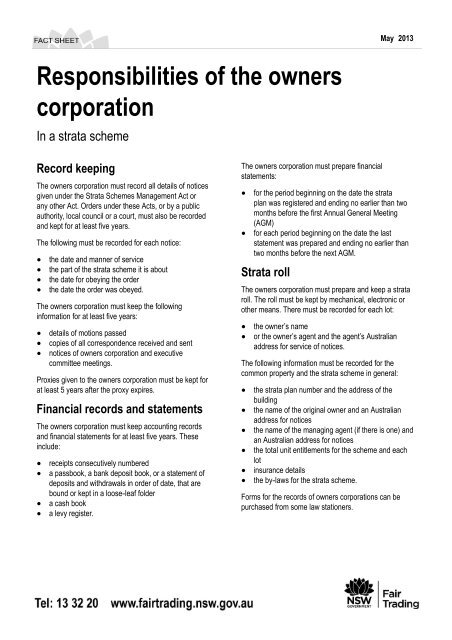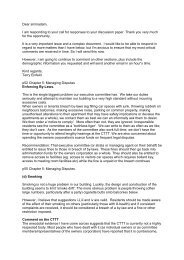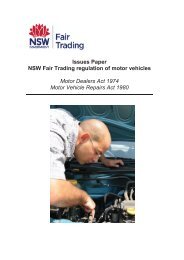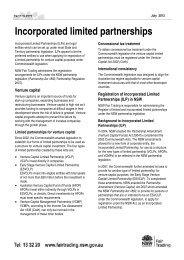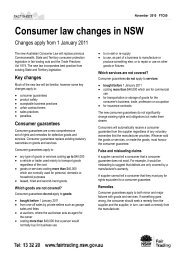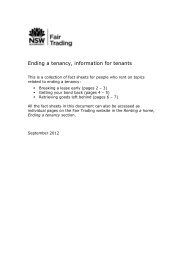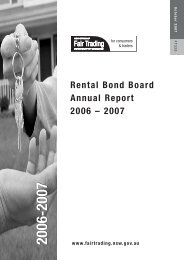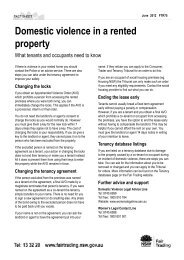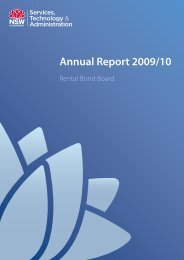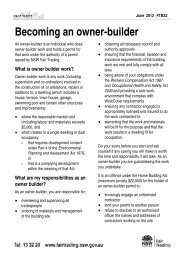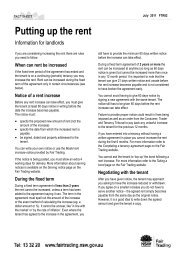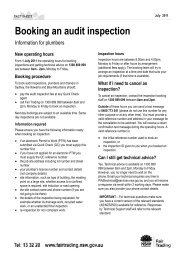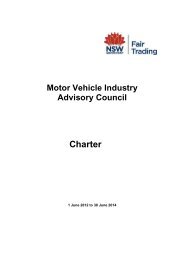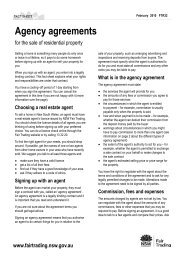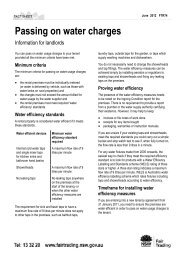Responsibilities of the owners corporation - NSW Fair Trading
Responsibilities of the owners corporation - NSW Fair Trading
Responsibilities of the owners corporation - NSW Fair Trading
Create successful ePaper yourself
Turn your PDF publications into a flip-book with our unique Google optimized e-Paper software.
<strong>Responsibilities</strong> <strong>of</strong> <strong>the</strong> <strong>owners</strong><br />
<strong>corporation</strong><br />
In a strata scheme<br />
Record keeping<br />
The <strong>owners</strong> <strong>corporation</strong> must record all details <strong>of</strong> notices<br />
given under <strong>the</strong> Strata Schemes Management Act or<br />
any o<strong>the</strong>r Act. Orders under <strong>the</strong>se Acts, or by a public<br />
authority, local council or a court, must also be recorded<br />
and kept for at least five years.<br />
The following must be recorded for each notice:<br />
● <strong>the</strong> date and manner <strong>of</strong> service<br />
● <strong>the</strong> part <strong>of</strong> <strong>the</strong> strata scheme it is about<br />
● <strong>the</strong> date for obeying <strong>the</strong> order<br />
● <strong>the</strong> date <strong>the</strong> order was obeyed.<br />
The <strong>owners</strong> <strong>corporation</strong> must keep <strong>the</strong> following<br />
information for at least five years:<br />
● details <strong>of</strong> motions passed<br />
● copies <strong>of</strong> all correspondence received and sent<br />
● notices <strong>of</strong> <strong>owners</strong> <strong>corporation</strong> and executive<br />
committee meetings.<br />
Proxies given to <strong>the</strong> <strong>owners</strong> <strong>corporation</strong> must be kept for<br />
at least 5 years after <strong>the</strong> proxy expires.<br />
Financial records and statements<br />
The <strong>owners</strong> <strong>corporation</strong> must keep accounting records<br />
and financial statements for at least five years. These<br />
include:<br />
● receipts consecutively numbered<br />
● a passbook, a bank deposit book, or a statement <strong>of</strong><br />
deposits and withdrawals in order <strong>of</strong> date, that are<br />
bound or kept in a loose‑leaf folder<br />
● a cash book<br />
● a levy register.<br />
The <strong>owners</strong> <strong>corporation</strong> must prepare financial<br />
statements:<br />
May 2013<br />
● for <strong>the</strong> period beginning on <strong>the</strong> date <strong>the</strong> strata<br />
plan was registered and ending no earlier than two<br />
months before <strong>the</strong> first Annual General Meeting<br />
(AGM)<br />
● for each period beginning on <strong>the</strong> date <strong>the</strong> last<br />
statement was prepared and ending no earlier than<br />
two months before <strong>the</strong> next AGM.<br />
Strata roll<br />
The <strong>owners</strong> <strong>corporation</strong> must prepare and keep a strata<br />
roll. The roll must be kept by mechanical, electronic or<br />
o<strong>the</strong>r means. There must be recorded for each lot:<br />
● <strong>the</strong> owner’s name<br />
● or <strong>the</strong> owner’s agent and <strong>the</strong> agent’s Australian<br />
address for service <strong>of</strong> notices.<br />
The following information must be recorded for <strong>the</strong><br />
common property and <strong>the</strong> strata scheme in general:<br />
● <strong>the</strong> strata plan number and <strong>the</strong> address <strong>of</strong> <strong>the</strong><br />
building<br />
● <strong>the</strong> name <strong>of</strong> <strong>the</strong> original owner and an Australian<br />
address for notices<br />
● <strong>the</strong> name <strong>of</strong> <strong>the</strong> managing agent (if <strong>the</strong>re is one) and<br />
an Australian address for notices<br />
● <strong>the</strong> total unit entitlements for <strong>the</strong> scheme and each<br />
lot<br />
● insurance details<br />
● <strong>the</strong> by‑laws for <strong>the</strong> strata scheme.<br />
Forms for <strong>the</strong> records <strong>of</strong> <strong>owners</strong> <strong>corporation</strong>s can be<br />
purchased from some law stationers.
Large schemes<br />
A large scheme is one with more than 100 lots. Parking<br />
and utility lots are not counted in <strong>the</strong> calculation. Some<br />
special provisions apply to large schemes:<br />
● financial accounts must be audited every year<br />
● annual budgets must list amounts expected to be<br />
spent on specific items<br />
● at least two quotes must be obtained by <strong>the</strong> <strong>owners</strong><br />
<strong>corporation</strong> for items <strong>of</strong> expenditure over $30,000<br />
● executive committees <strong>of</strong> large schemes are<br />
not permitted to spend more than 10% above<br />
<strong>the</strong> budgeted amount for any item, except for<br />
emergencies, eg blocked sewer pipes (unless<br />
<strong>the</strong> <strong>owners</strong> <strong>corporation</strong> lifts <strong>the</strong> restriction by a<br />
resolution)<br />
● proxy votes for a <strong>owners</strong> <strong>corporation</strong> meeting must<br />
be provided to <strong>the</strong> secretary at least 24 hours before<br />
<strong>the</strong> meeting<br />
● personal notice <strong>of</strong> all upcoming executive committee<br />
meetings and <strong>the</strong> minutes <strong>of</strong> <strong>the</strong>se meetings must be<br />
given to all lot <strong>owners</strong> (notice may not be given via<br />
noticeboards).<br />
Insurances<br />
Building insurance<br />
The <strong>owners</strong> <strong>corporation</strong> must insure <strong>the</strong> building under<br />
a damage policy with an approved insurer. This does<br />
not apply to an <strong>owners</strong> <strong>corporation</strong> for a strata scheme<br />
comprising two lots if <strong>the</strong> <strong>owners</strong> <strong>corporation</strong> decides<br />
by unanimous resolution, and <strong>the</strong> buildings in one lot<br />
are physically detached from <strong>the</strong> buildings in <strong>the</strong> o<strong>the</strong>r<br />
lot, and no o<strong>the</strong>r building in <strong>the</strong> scheme is on common<br />
property.<br />
Approved insurers are those authorised by <strong>the</strong> Australian<br />
Prudential Regulation Authority for general insurance.<br />
A damage policy must cover <strong>the</strong> building for:<br />
● replacement (where destroyed) or <strong>the</strong> reinstatement<br />
(where damaged) <strong>of</strong> <strong>the</strong> building back to <strong>the</strong> same<br />
condition it was in when new, and<br />
● payment for removal <strong>of</strong> debris and <strong>the</strong> payment <strong>of</strong><br />
architects and o<strong>the</strong>rs whose services are needed for<br />
<strong>the</strong> replacement or reinstatement.<br />
May 2013<br />
The building includes <strong>owners</strong>’ fixtures and fittings.<br />
Fixtures and fittings are items like carpets in common<br />
areas, hot water systems, light fittings, toilet bowls, sinks,<br />
shower screens, cupboards, internal doors, stoves,<br />
common air conditioning systems and intercom systems.<br />
The building must be valued every five years and insured<br />
for at least that value.<br />
Public liability insurance<br />
The <strong>owners</strong> <strong>corporation</strong> must insure, with an approved<br />
insurer, against damage to property, death or injury for<br />
which <strong>the</strong> <strong>owners</strong> <strong>corporation</strong> could become responsible.<br />
The minimum amount <strong>of</strong> cover is $10 million.<br />
Workers compensation insurance<br />
The <strong>owners</strong> <strong>corporation</strong> must have workers<br />
compensation insurance, with an approved insurer,<br />
where it is required under <strong>the</strong> Workers Compensation Act<br />
1987.<br />
Voluntary workers insurance<br />
The <strong>owners</strong> <strong>corporation</strong> must insure, with an approved<br />
insurer, against any damage that it may become liable<br />
for when a person does voluntary work for <strong>the</strong> <strong>owners</strong><br />
<strong>corporation</strong> in <strong>the</strong> building or on <strong>the</strong> common property.<br />
A voluntary worker is any person who does work without<br />
any fee or reward, or without expecting any fee or<br />
reward.<br />
Levies and <strong>the</strong> administrative and<br />
sinking funds<br />
The <strong>owners</strong> <strong>corporation</strong> must levy (charge) <strong>owners</strong> in<br />
<strong>the</strong> strata scheme to raise enough funds to carry out its<br />
duties. All levies must be worked out in proportion to <strong>the</strong><br />
unit entitlements <strong>of</strong> each lot.<br />
Administrative fund<br />
The administrative fund is for day‑to-day recurrent<br />
expenses. The amount in it must be enough for <strong>the</strong><br />
<strong>owners</strong> <strong>corporation</strong> to pay its expenses:<br />
● for <strong>the</strong> cost <strong>of</strong> looking after common property and<br />
personal property <strong>of</strong> <strong>the</strong> <strong>owners</strong> <strong>corporation</strong>
● for <strong>the</strong> payment <strong>of</strong> insurance premiums<br />
● for any o<strong>the</strong>r recurrent expenses o<strong>the</strong>r than amounts<br />
covered by <strong>the</strong> sinking fund or by a special levy.<br />
Sinking fund<br />
The sinking fund is to cover future capital needs. The<br />
amount in <strong>the</strong> fund must be enough to cover all <strong>the</strong><br />
<strong>owners</strong> <strong>corporation</strong>’s expenses:<br />
● for painting <strong>of</strong> common property<br />
● for obtaining personal property <strong>of</strong> <strong>the</strong> <strong>owners</strong><br />
<strong>corporation</strong> (eg. mowers or washing machines)<br />
● for renewing or replacing any fixtures on <strong>the</strong> common<br />
property and any personal property owned by <strong>the</strong><br />
<strong>owners</strong> <strong>corporation</strong><br />
● to replace, repair or make good <strong>the</strong> common property<br />
● for any debts, o<strong>the</strong>r than amounts covered by <strong>the</strong><br />
administrative fund<br />
● for o<strong>the</strong>r capital expenses.<br />
Ten year sinking fund plans<br />
All schemes are required to have a ten year sinking<br />
fund plan for <strong>the</strong> life <strong>of</strong> <strong>the</strong> scheme. The plan has to be<br />
reviewed at least every five years.<br />
Refer to <strong>the</strong> Sinking funds page on <strong>the</strong> <strong>Fair</strong> <strong>Trading</strong><br />
website for more information.<br />
Transfer <strong>of</strong> money between funds<br />
The <strong>owners</strong> <strong>corporation</strong> can transfer money from one<br />
fund to <strong>the</strong> o<strong>the</strong>r, or make a payment from one fund that<br />
should have been paid from <strong>the</strong> o<strong>the</strong>r. But <strong>the</strong> <strong>owners</strong><br />
<strong>corporation</strong> must make a levy to repay that fund within<br />
three months after <strong>the</strong> transfer <strong>of</strong> monies.<br />
Setting levies<br />
Levies must be set at each AGM. When a levy is to<br />
be set, a budget must be given, showing <strong>the</strong> existing<br />
financial situation and an estimate <strong>of</strong> receipts and<br />
payments. The budget can be given out with <strong>the</strong> notice<br />
<strong>of</strong> <strong>the</strong> meeting or at <strong>the</strong> meeting before voting on <strong>the</strong> levy<br />
motion.<br />
The motion to set <strong>the</strong> levies must show <strong>the</strong> amount for<br />
each fund and be approved by a majority vote.<br />
May 2013<br />
The <strong>owners</strong> <strong>corporation</strong> may decide to allow payments<br />
by instalments.<br />
After <strong>the</strong> levies are set, <strong>the</strong> Treasurer must write to <strong>the</strong><br />
<strong>owners</strong> and tell <strong>the</strong>m <strong>the</strong> amount to pay and <strong>the</strong> date to<br />
pay. This notice only has to be given once.<br />
Extra levy<br />
If <strong>the</strong> <strong>owners</strong> <strong>corporation</strong> has to pay a debt that was<br />
not budgeted for in <strong>the</strong> administrative or sinking fund<br />
estimates, a levy must be set at a general meeting and<br />
<strong>the</strong> amount collected paid to <strong>the</strong> administrative fund.<br />
Interest and discounts on levies<br />
An unpaid levy gains interest at <strong>the</strong> rate <strong>of</strong> 10% simple<br />
interest a year if not paid within one month after it is due.<br />
The <strong>owners</strong> <strong>corporation</strong> cannot increase or decrease <strong>the</strong><br />
interest but it can make a special resolution to charge<br />
no interest. Unpaid levies, including interest, can be<br />
recovered by <strong>the</strong> <strong>owners</strong> <strong>corporation</strong> as a debt in court.<br />
An <strong>owners</strong> <strong>corporation</strong> may make a special resolution<br />
to give a 10% discount where a levy is paid before <strong>the</strong><br />
day it is due. Payment made on <strong>the</strong> day it is due does not<br />
attract <strong>the</strong> discount.<br />
Legal action<br />
Should an <strong>owners</strong> <strong>corporation</strong> wish to commence legal<br />
action <strong>of</strong> any type in its administration <strong>of</strong> <strong>the</strong> scheme,<br />
(including <strong>the</strong> obtaining <strong>of</strong> legal advice), where payment<br />
<strong>of</strong> money is involved, specific steps must be taken.<br />
Firstly, <strong>the</strong> decision to commence legal action will <strong>of</strong>ten<br />
have to be approved by a general meeting <strong>of</strong> <strong>the</strong> <strong>owners</strong><br />
<strong>corporation</strong> (by majority vote).<br />
Secondly, where <strong>the</strong> estimated costs <strong>of</strong> legal action<br />
have been disclosed under <strong>the</strong> Legal Pr<strong>of</strong>ession Act to<br />
<strong>the</strong> <strong>owners</strong> <strong>corporation</strong> this must be passed on to all<br />
lot <strong>owners</strong> and executive committee members within<br />
seven days <strong>of</strong> this information being given to <strong>the</strong> <strong>owners</strong><br />
<strong>corporation</strong>.<br />
When an <strong>owners</strong> <strong>corporation</strong> undertakes residential<br />
building work and a contractual dispute with <strong>the</strong> builder or<br />
tradesperson arises, <strong>the</strong> <strong>owners</strong> <strong>corporation</strong> can take <strong>the</strong><br />
matter to <strong>the</strong> Consumer, Trader and Tenancy Tribunal.
This can happen even if <strong>the</strong> builder or tradesperson<br />
invokes <strong>the</strong> Building and Construction Industry Security<br />
<strong>of</strong> Payment Act 1999 to claim any money <strong>the</strong>y are owed<br />
under <strong>the</strong> contract.<br />
Legal advice, services or action that concern <strong>the</strong><br />
recovery <strong>of</strong> unpaid levies is exempt from <strong>the</strong> requirement<br />
for approval.<br />
O<strong>the</strong>r responsibilities<br />
Owners <strong>corporation</strong>s also have <strong>the</strong> following powers and<br />
obligations:<br />
● To issue a notice on a person to comply with a<br />
by‑law, when <strong>the</strong> <strong>owners</strong> <strong>corporation</strong> or its executive<br />
committee passes a resolution that <strong>the</strong>re has been a<br />
contravention <strong>of</strong> <strong>the</strong> by‑law in question.<br />
● Provide strata scheme information as required by a<br />
Section 109 Certificate for prospective purchasers<br />
within 14 days <strong>of</strong> written request.<br />
● Allow owner or a person with <strong>the</strong> owner's consent to<br />
inspect <strong>the</strong> records <strong>of</strong> <strong>the</strong> strata scheme, and collect<br />
an inspection fee.<br />
● Power to grant, by special resolution, a licence to<br />
a lot owner to use common property generally or<br />
for a ‘once only’ purpose. Adjudicators can make<br />
decisions on disputes or complaints which have<br />
not been resolved by mediation, and have power<br />
to settle disputes over <strong>the</strong> granting <strong>of</strong> licences over<br />
common property.<br />
● To dismiss some or all <strong>of</strong> its executive committee.<br />
● To notify those holding a priority vote <strong>of</strong> all meetings<br />
where <strong>the</strong>re are agenda items where a priority vote<br />
may be exercised.<br />
Strata scheme lot <strong>owners</strong> may be liable for land tax. For<br />
more information, visit www.osr.nsw.gov.au.<br />
Two‑lot schemes<br />
If <strong>owners</strong> <strong>of</strong> two‑lot strata schemes choose to have <strong>the</strong><br />
scheme's accounts audited, <strong>the</strong> audit is not necessarily<br />
required to meet <strong>the</strong> Australian Auditing Standard.<br />
Fire safety inspections<br />
May 2013<br />
The <strong>owners</strong> <strong>corporation</strong> is responsible for ensuring<br />
that access to all parts <strong>of</strong> <strong>the</strong> scheme is provided for<br />
necessary fire safety inspections.<br />
Pesticide notification<br />
From February 2007, <strong>the</strong> <strong>NSW</strong> Pesticides Regulation<br />
requires that residents <strong>of</strong> multiple occupancy dwellings<br />
must be notified when licensed pest controllers apply<br />
pesticides to <strong>the</strong> internal or external common areas <strong>of</strong><br />
<strong>the</strong>ir residence.<br />
The rules apply to residential strata, community and<br />
company title schemes consisting <strong>of</strong> three or more<br />
dwellings, retirement villages, and caravan parks with<br />
long term residents.<br />
The person responsible for organising <strong>the</strong> pest treatment<br />
must make sure that residents are given at least five<br />
working days notice. Notice <strong>of</strong> <strong>the</strong> treatment can be<br />
given in person, by fax, by email or telephone, by post,<br />
in letterboxes, under doors or by placing it on common<br />
notice boards and near <strong>the</strong> main building entrance.<br />
Full details, fact sheets and blank notice forms are<br />
available from <strong>the</strong> <strong>NSW</strong> Office <strong>of</strong> Environment and<br />
Heritage on 13 15 55 or at www.environment.nsw.gov.au.<br />
Swimming pools<br />
If a strata scheme has a swimming pool on <strong>the</strong> premises<br />
it is <strong>the</strong> responsibility <strong>of</strong> <strong>the</strong> <strong>owners</strong> <strong>corporation</strong> to<br />
ensure that <strong>the</strong> pool is fenced and meets pool fencing<br />
requirements. Please visit <strong>the</strong> Pool fencing requirements<br />
page on <strong>the</strong> <strong>Fair</strong> <strong>Trading</strong> website for fur<strong>the</strong>r information.<br />
Additionally, in 2012 a number <strong>of</strong> amendments were<br />
made to <strong>the</strong> Swimming Pools Act 1992 to improve <strong>the</strong><br />
safety <strong>of</strong> children around swimming pools in <strong>NSW</strong>.<br />
These changes provide that from 29 April 2013, pool<br />
<strong>owners</strong> register <strong>the</strong>ir swimming pool with <strong>the</strong> Division<br />
<strong>of</strong> Local Government. Registration must be done by 29<br />
October 2013. From 29 April 2014, all multi occupancy<br />
developments will require a valid compliance certificate.<br />
Owners <strong>corporation</strong>s must ensure that <strong>the</strong>ir property<br />
complies with <strong>the</strong>se new requirements. No action<br />
needs to be taken by individual lot <strong>owners</strong>, unless <strong>the</strong>y
have a pool or spa within <strong>the</strong>ir lot that is required to<br />
be registered. Registration <strong>of</strong> each pool only has to<br />
be done once. If required, a strata managing agent<br />
can organise this on behalf <strong>of</strong> <strong>the</strong> scheme. Please visit<br />
<strong>the</strong> Swimming pools page on <strong>the</strong> <strong>Fair</strong> <strong>Trading</strong> website for<br />
fur<strong>the</strong>r information on <strong>the</strong> changes.<br />
www.fairtrading.nsw.gov.au<br />
<strong>Fair</strong> <strong>Trading</strong> enquiries 13 32 20<br />
TTY 1300 723 404<br />
Language assistance 13 14 50<br />
This fact sheet must not be relied<br />
on as legal advice. For more<br />
information about this topic, refer to<br />
<strong>the</strong> appropriate legislation.<br />
May 2013<br />
© State <strong>of</strong> New South Wales through <strong>NSW</strong> <strong>Fair</strong> <strong>Trading</strong><br />
You may freely copy, distribute, display or download this information with<br />
some important restrictions. See <strong>NSW</strong> <strong>Fair</strong> <strong>Trading</strong>'s copyright policy at<br />
www.fairtrading.nsw.gov.au or email publications@services.nsw.gov.au


